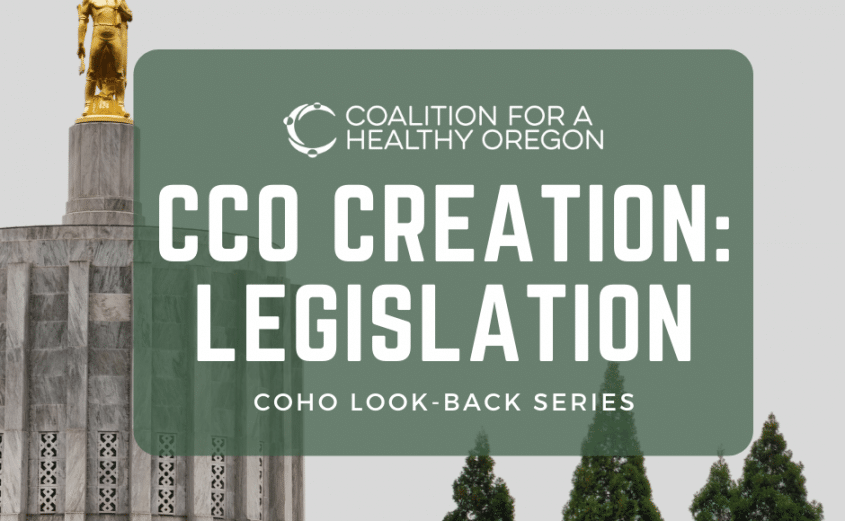CCO Creation: Legislation (SB 1580)
In Oregon, about 23.8 percent of our population uses the Oregon Health Plan (OHP) for their health insurance. That means CCOs across the state are serving roughly 984,106 Oregonians by ensuring they have access to equitable, timely, and appropriate health services. This current organization that utilizes CCOs as a single point of contact for Medicaid health services is not always what OHP looked like.
In 2012, our state was at a breaking point. If we did not change the way we ran our Medicaid delivery service, we were looking at taking a 33 percent cut in reimbursement rates to providers. Because the Medicaid reimbursement rate is already much lower than other health insurance companies offer, this cut would have decimated the Oregon Health Plan. Health care providers across the state would have been unable to see Oregonians on OHP because the rate would not have covered the cost of the visit to the provider.
Not only were we looking down the barrel of a giant cut in reimbursement rates, the system that we had was not working for OHP members, either. Instead of OHP being a single over-arching health plan that included physical health, mental health, and dental health, it was broken into three different plans. These plans did not communicate among themselves, making it incredibly difficult for OHP members to understand how their Medicaid coverage worked, and how to effectively navigate the system.
Former Governor Kitzhaber, as well as several legislators, lobbyists, and other elected officials, stepped in to address not only the budgetary issue, but the concern that Oregonians were not receiving the care they needed due to systemic problems. To address the concern that Oregonians could not navigate the current Medicaid system, Governor Kitzhaber recommended the state create a single point of contact for physical, mental health, and dental services that works to organize not only OHP members, but providers as well. He thought that by coordinating the care that OHP members were receiving, we could increase our efficiency and decrease the cost.
Dr. Bruce Goldberg, the Director of the Oregon Health Authority at the time, was also at the forefront of the state’s push to re-organize our Medicaid system. Dr. Goldberg believed that we could make OHP easier to navigate, save the state dollars on health care, and push for incentives that create better health outcomes for Oregonians.
So, Governor Kitzhaber, Dr. Bruce Goldberg, Rep. Tina Kotek, Rep. Tim Freeman, and Sen. Alan Bates worked with lobbyists including Paul Phillips and Josh Balloch to create a new Medicaid program that would serve Oregonians, save our Medicaid program, push for better outcomes, and save the state money. Their ideas were groundbreaking and included concepts like utilizing a global budget for CCOs, creating incentive programs to increase positive health outcomes for Oregonians, and setting rate of growth allowances to lower than the national average.
Every piece of this legislation was important. Global budgets ensure that the CCO, instead of the state, takes on the risk of paying out reimbursements for members. Incentives for CCOs to increase positive health outcomes push CCOs to continue transforming health care in new and creative ways, like including social determinants of health spending on food security, housing security, etc. Finally, setting the CCO’s rate of growth allowance 2% below the national average could save $2 billion dollars over four years.
Not everyone was a fan of the new plan for Medicaid. Powerful status quo providers were not interested in changing the way OHP was structured, and there were several other competing pieces of legislation. On top of that, the House was evenly split between 30 Republicans and 30 Democrats and headed by two co-speakers, making the job of these public officials and lobbyists even harder. Fortunately, this legislation passed off the Senate floor with 18 votes, and off the House floor with 53 votes. This was only possible because of the hard work of the many advocating for this change, and the bi-partisan understanding that Oregonians need access to quality health care.
The final step was securing federal funds to jump start the program. Gov. Kitzhaber and Director Goldberg flew to the White House to meet with President Obama. They shared our state’s revolutionary ideas for Medicaid delivery, and requested $1.9 billion dollars in Federal funds to start the program. They shared with the President that they planned to cap the CCOs at 2% below the national average rate of growth in health care so that they could save the Federal government $2 billion dollars within four years, effectively paying back the state-up money. President Obama approved the funding request whole-heartedly, and the Oregon Health Plan was reborn.
The legislation that they dreamt up in 2012 is still in effect today, ensuring that Oregonians get the care they need, the state saves money, and that we continue to push for health transformation that stays true to the original member-centered, locally-controlled CCO model.
Thank you, Governor Kitzhaber, Dr. Goldberg, Rep. Kotek, Commissioner Freeman, the late Sen. Bates, COHO lobbyists and members who helped conceive and pass this legislation, and the countless others who were involved in fighting for the Medicaid delivery system we have today!



